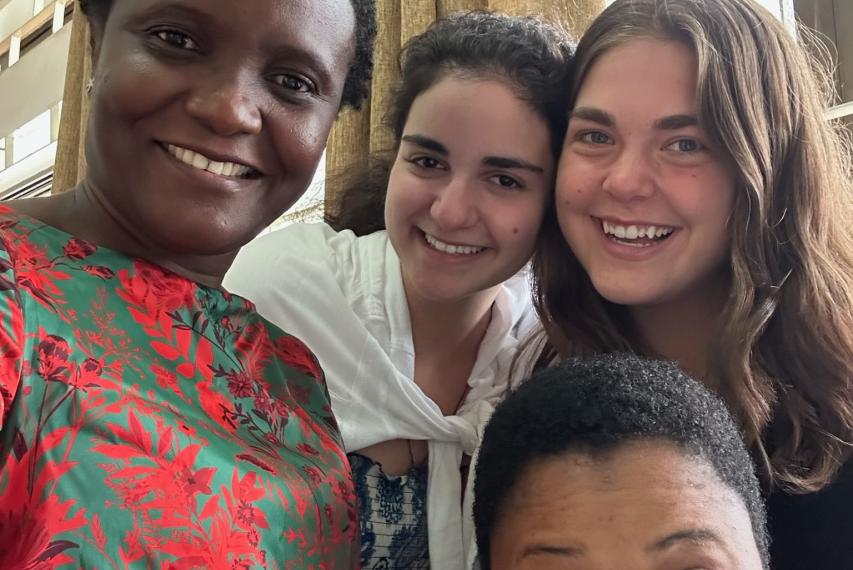
1. What are you doing and where are you?
We are in Moshi, Tanzania working at the Kilimanjaro Clinical Research Institute. Our study is a formative assessment of a possible mobile health intervention for TB/HIV patients. Through qualitative interviews, we aim to determine if and how a smartphone application could increase medication adherence, support health record access, and improve communication between patients and care providers.
2. What surprised you about this experience?
Overall we went into this experience excited about anything that came our way. At the same time, we acknowledged that we were unfamiliar with the country and wanted to make sure we respected their culture, from our comportment to the way we dressed. Our coworkers were kind enough to teach us how to properly eat ugali with our hands, pick out fruits at the market, and greet local elders. We stepped outside of our comfort zones and said yes as much as possible, learning that cultural differences are just an opportunity to connect and grow. Consequently, we immersed ourselves in Tanzanian culture and learned so much in the weeks we were there.
3. Who have you learned from? What is your community like?
We had the privilege to meet an amazing group of female researchers at the Biotechnology lab (Dr. Margaretha Sariko, Dr. Saumu Pazia, Dr. Happiness Kumburu, and others). They welcomed us into their homes, taught us how to eat traditional food, and showed us the Moshi way of life.These women have become role models for us - they work long hours, are loving mothers, and still took time to be generous hosts. We were welcomed into the community at the Biotech lab to have tea and eat lunch every day. In addition, we have also spent a lot of time with our neighbors at the doctors compound, a collection of houses next to KCMC (the Kilimanjaro Christian Medical Center). There, we met visiting medical students and doctors as well as local KCMC care providers and their families. We often had dinners and hung out with our Tanzanian neighbor, Emmanuel Samky, and explored Moshi (and surrounding areas) with other visiting students.
4. How does this relate to your UVA academic experience?
This trip has complimented our education at UVA immensely. We were able to put the skills and theoretical knowledge that we acquired in our bachelor studies into practice in an impactful way. In terms of skills developed, we got to engage in the development of the interview guide for patients. We thought critically and empathetically about the concerns and obstacles of Tanzanian patients in order to develop context-dependent questions. We also recognized our cultural knowledge limitations and frequently consulted our local colleagues about local differences. Coming from a business background and both studying IT, we also worked heavily on the app prototype development. With such, we were able to incorporate product management tools, design thinking skills, and UX considerations.
Living abroad and seeing how things operate differently is a privilege. These lessons are difficult to replicate in a classroom. As Carolin enters the international development space and Liza furthers her education in the medical field, we will both be carrying new perspectives with us. This experience has widened our understanding of global issues and will ensure that we approach problems more critically and through an inclusive international lens.
5. What lessons will you take with you from this experience?
It is important to break the bubble you live within and learn to experience how people from other cultures navigate work and personal lives. Our coworkers, and many other Tanzanians that we met, would tell us to pole pole (slow down) at times. As Americans, and especially as UVA students, we tend to dive into our work with speedy ambition. In Tanzania, they enjoy the process as much as the end result. They take their time to iron out the details, with their attentiveness serving both the quality of the end result and satisfaction in their professional life. Part of slowing down includes asking why more often. While being here in Tanzania, we have learned how important it is to consider other explanations or perspectives. It is very easy to take shortcuts and assume you know what others are thinking or why they are doing something, but oftentimes a person's reasoning is different than you might expect. In the US, there are people from diverse backgrounds living together, but people often forget to engage in meaningful open-minded dialogue to understand each other. Our colleagues in Moshi always challenged us by questioning why we were doing something a certain way. Sometimes our explanation would be easy, sometimes it would surprise or confuse them, and sometimes we wouldn’t have an explanation ourselves and it helped us clarify our own purpose of doing something - small or big. Asking a lot of questions has allowed our local friends there to understand us much better and allowed us to understand them and their culture.
This gave us a bit of a reality check for our everyday academic lives at UVA. Coming back, we hope to be more present in enjoying the learning process rather than over-emphasizing a grade-determining result. We will also ask more questions to our friends at home, and at work. In our future professional lives, we will channel our intrinsic motivation and pole pole to make sure we enjoy the journey. We will miss Moshi, and the friends we have made there, but we are excited to spread a bit of the Tanzanian way of life in our communities at home.
